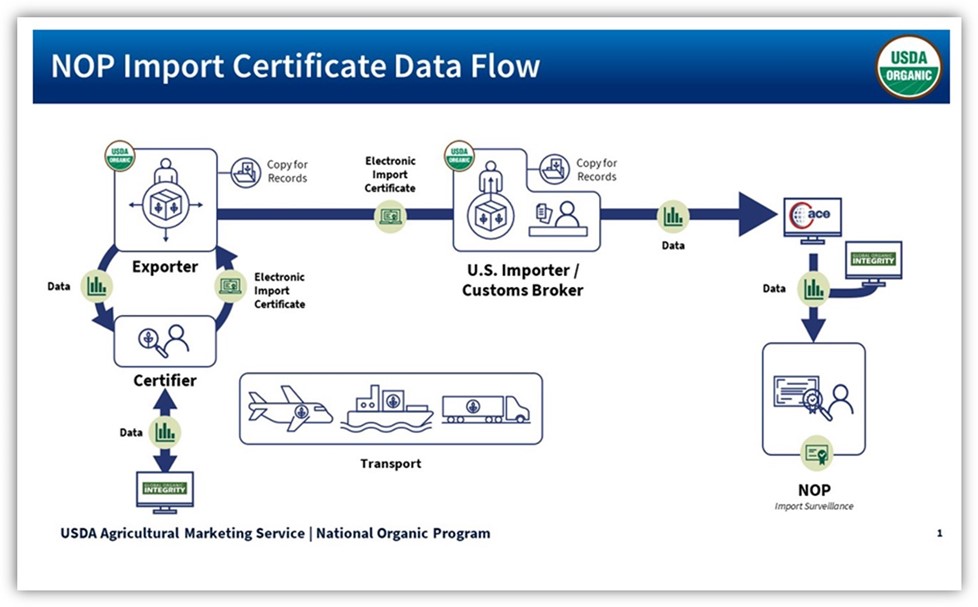
The USDA National Organic Program’s Strengthening Organic Enforcement (SOE) Rule requires all organic imports into the United States to be declared as organic and associated with a NOP Import Certificate. This change will improve traceability and oversight of organic imports into the United States. A NOP Import Certificate is a transaction certificate that contains detailed information about the quantity and origin of organic product being imported into the United States. Currently, this document is only required for shipments from countries where the USDA has established an equivalence arrangement. Starting March 19, 2024, this document will be required for all organic imports, including those certified to the NOP organic standard.
Do you export to the United States from Canada or Mexico?
CCOF wants to know more about your business! To help us build efficient systems to process NOP Import Certificate requests, please complete this short survey: https://forms.microsoft.com/r/sRhBUG9h6a
Get Certified With CCOF
Under the SOE regulation, exporters and importers must be certified organic to be listed on the NOP Import Certificate. Our team is ready to help your operation comply with the new requirements. CCOF strives to process import/export certificate requests within two business days and is a leader in the industry. NOP Import Certificates are billed per the CCOF Certification Services Manual. If you work with an uncertified importer, encourage them to apply early. Thousands of operations will be affected and need to be fully certified by the March 19 deadline to maintain their products’ organic integrity.
Operations in need of certification should contact getcertified@ccof.org or call (831) 423-2263 ext. 1 to learn more about our 2023 SOE discount.
NOP Import Certificate Process
- The exporter in the foreign country will request the NOP Import Certificate from their certifier.
- The certifier will review the request and issue the NOP Import Certificate in the USDA Organic Integrity Database.
- The certifier will provide the NOP Import Certificate to the exporter, who will then provide the certificate information to the U.S. importer.
- Each NOP Import Certificate will have a unique identification number. As a part of its standard filing process, the U.S. importer or customs broker enters the NOP Import Certificate number into the CBP ACE system (U.S. Customs and Border Patrol Automated Commercial Environment). This will associate the shipment details in ACE with the import certificate information. The NOP Import Certificate does not have to physically accompany the shipment as long as the data is associated with the shipment in ACE. This process is governed by timelines determined by CBP. The NOP Import Certificate should be available for review at the importer’s organic inspection.
Transaction vs. Time Frame
The certifier may issue the NOP Import Certificate for a single transaction, or in certain cases may issue an NOP Import Certificate for a specific time frame. If issued for a time frame, the NOP Import Certificate would cover a certain amount of product shipped over that time period. The allowance for time frame certificates can alleviate the administrative burden for operations with a high frequency of shipments, especially for fresh produce coming overland from Canada or Mexico.
Responsibilities for the Exporter to the United States
- Request the NOP Import Certificate from their certifier.
- Identify products as organic on all export documents, including but not limited to invoices, packing lists, bills of lading, and U.S. Customs and Border Protection entry data.
- Verify that the exported product has not been exposed to a prohibited substance, treated with a prohibited substance as a result of fumigation, or treated with ionizing radiation at any point in the products’ movements across the country border.
Responsibilities for the U.S. Importer
- Ensure that the import is accompanied by accurate NOP Import Certificate data.
- Ensure products are identified as organic on all import documents, including but not limited to invoices, packing lists, bills of lading, and U.S. Customs and Border Protection entry data.
- Maintain import documents on site and make them available for inspection.
- Verify that the shipment has had no contact with prohibited substances or exposure to ionizing radiation since export. The organic importer must have a documented organic control system to conduct this verification.
Timeline
Now: Exporters of NOP-certified organic products may voluntarily request an NOP Import Certificate for shipments into the United States. The ACE system has been updated to allow the upload of the NOP Import Certificate as an optional filing step.
Fall 2023: The USDA is developing an electronic tool for certifiers to issue the NOP Import Certificate using the USDA Organic Integrity Database. They anticipate this tool being ready for testing and use in fall 2023. CCOF encourages importers to familiarize themselves with the process prior to the implementation date. We will send additional information when this tool is ready for use.
March 19, 2024: SOE Rule is enforced. All organic imports into the United States must be declared organic and associated with an NOP Import Certificate.
Resources
CCOF NOP Import Certificate Request Packet
For more information and updates from the USDA, visit their Electronic Organic Import Certificate website and review the Strengthening Organic Enforcement Final Rule Primer.
For questions, contact export@ccof.org.
